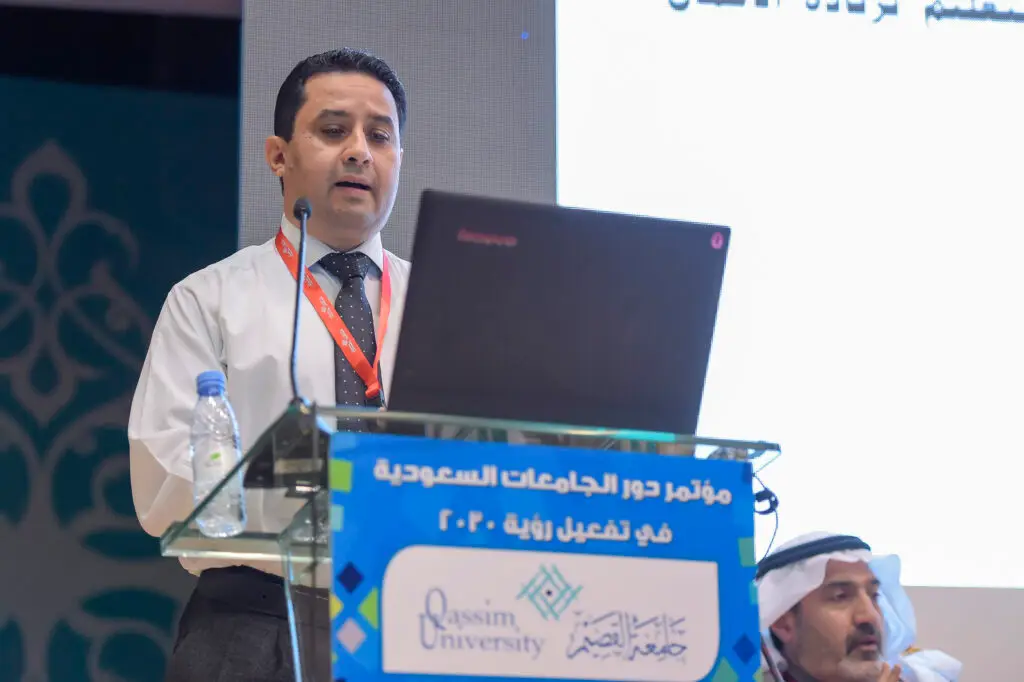A call to activate community service and voluntary work at universities and expand vocational education
Media and Communication Center:
Participants and researchers at the Role of Saudi Universities in Activating Vision 2030 conference, which was held at the university last week, presented a vision on the need to activate the role of the university in community service and volunteerism for the Saudi community,
During the session chaired by Dr. Awatif bint Ali Al-Saif, Dean of the Center forDr. Awatif bint Marzouq Al-Hazmi presented a paper entitled "A Proposed Conceptualization of the Role of Saudi Universities in Activating the Vision in the Field of Voluntary Service to the Community", which addressed the voluntary fields provided by Saudi universities to the community, and their obstacles, and the researcher proposed some means and mechanisms necessary to activate and participate in Saudi universities for voluntary work and developed a conceptualization of a proposal aimed at helping Saudi universities in activating voluntary work based on the Holy Quran and the Sunnah, and compatible with the nature of Saudi society.
Dr. Ahlam Hussein Al-Sadiq and Dr. Iqbal Mohammed Saleh Nasr from Imam Abdulrahman Al-Faisal University (formerly Dammam) called for the expansion of technical and vocational education in addition to academic education, a change in teaching methods and curricula, and seeking to publish in peer-reviewed scientific journals, in addition to developing a strategic plan for the scientific research process in universities and prioritizing it in a way that contributes to solving society's issues.
Dr. Maha Mohammed Zaki Ali, a professor at Taif University, emphasized the importance of the role of universities as one of the pillars of the educational system in achieving a vibrant society and a prosperous economy, and identified the steps to be taken to design a knowledge management strategy and addressed the most important issues and obstacles faced by universities through the application of a knowledge management strategy to improve job performance, enhance service quality, and save time.
Dr. Fatima Ayed Fawaz Al-Salami, a professor at King Saud University, presented a study on "The Role of Higher Education Institutions in Community Development from the Perspective of Faculty Members." She found that faculty members' assessments of ways to activate the role of higher education institutions in community development are high, and recommended the need for concerted efforts for the desired deepening and continuity of the relationship between university institutions and local community institutions.
In the session chaired by Dr. Abdulrahman bin Hussein Al-Wazzan, Assistant Undersecretary of the Emirate of Qassim Region, the researchers discussed a research paper entitled "The Unified Matrix for Global Rankings of Universities and Strategic Perspectives to Activate the Vision", presented by Dr. Osama Ahmed Abdulqader, Professor at Imam Abdulrahman Al-Faisal University, where he developed a unified matrix that includes eleven criteria that help reach an advanced global ranking among universities, in addition to proposing ten strategic perspectives to build global identity while maintaining the national constants, in addition to proposing ten strategic perspectives to build the global identity.
Dr. Abdulmalik bin Taher Al Mekhlafi, a professor at King Saud University, presented a study on "Governmental Entrepreneurship Education and its Role in Achieving the Vision's Goals", which addressed the weaknesses in the entrepreneurship education system in public universities, in terms of lack of interest in organizing field visits for students to entrepreneurial companies, lack of availability of courses that can prepare students with high entrepreneurial ability and spirit, lack of adoption of modern methods in teaching entrepreneurship, and weak relationship between public universities and the entrepreneurial sector in the Kingdom, as well as the weakness of the relationship between public universities and the entrepreneurial sector in the Kingdom.
A research paper was also presented by Dr. Ali Muhammad Al-Shaari, Dr. Hamid Abdul Jabbar Al-Alawani, Dr. Raed Abdulrahman, Dr. Sahl Abdullah Wahib, Dr. Al-Tahir Azhar, and Dr. Muhammad Yusuf, professors at Umm Al-Qura University, entitled "The third mission of universities and their role in promoting the vision and defining the role of universities in it, and how to develop their main tasks in education and training, research in transferring and localizing knowledge and technologies, supporting innovation and entrepreneurship, contributing to building intellectual capital and achieving the requirements of comprehensive sustainable development.
Dr. Abdulmohsen bin Hussein Al-Arfaj, a professor at King Faisal University, proposed the development of integrated professional rules for faculty members towards students in light of the vision, containing a preliminary list of practices based on the researcher's experience in the higher education sector, then developing the proposal based on a meeting with a group of faculty members, and presenting it to deans and vice deans for academic affairs, heads of departments and members of quality committees and development of study plans at King Faisal University.



